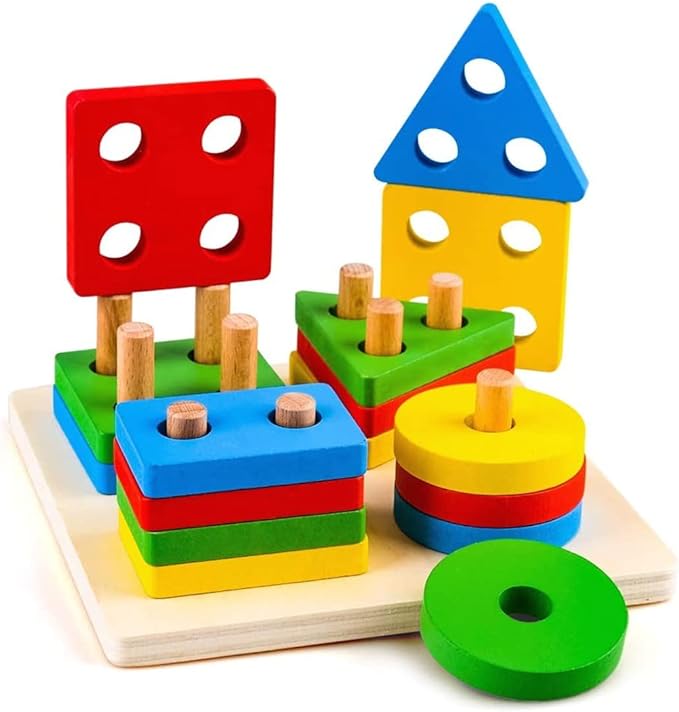
- Develops fine motor skills
- color recognition
- size differentiation
Use during free playtime or as a calming activity before naps.
This toy usually consists of wooden pieces that can be stacked or arranged in various ways. It's designed to enhance motor skills, problem-solving abilities, and creative thinking in children, usually in the age range of toddlers and preschoolers.
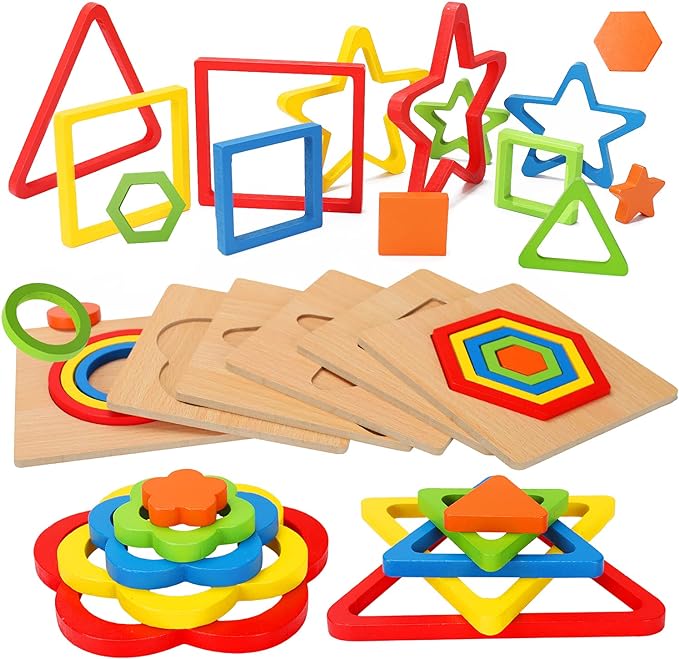
- Enhances shape recognition
- motor skills
- problem-solving
Integrate into morning routines for a fun learning start to the day.
The Shape Sorting Puzzle Montessori Toy is typically crafted from high-quality, child-safe wood, ensuring durability and a smooth texture for young hands. This toy includes a variety of geometric shapes such as circles, squares, triangles, and rectangles, each painted in vibrant, eye-catching colors. The puzzle is complemented by a board or container featuring slots that are specifically designed to match each individual shape, encouraging children to fit each piece into its correct place. The design and build of this toy adhere to the Montessori principles of simplicity and self-directed learning, making it a popular choice in both educational settings and home playrooms.
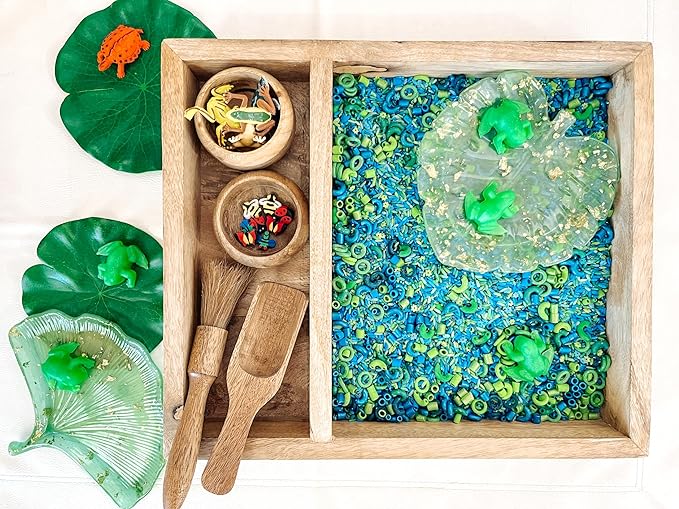
- Promotes sensory development
- exploration
- creativity
Use during sensory play sessions, especially after structured activities.
Sensory Bin Kits are used in educational settings and homes to promote sensory play, which is crucial for a child's development. They help in developing fine motor skills, fostering creativity, and providing an immersive learning experience. The variety in textures and objects included in these kits offers an engaging way for children to explore and learn about their environment through touch, sight, and sometimes sound.
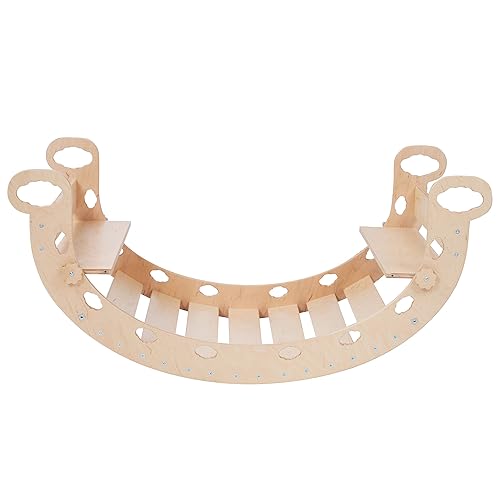
- Improves balance
- coordination
- physical fitness
Include in physical playtime, both indoors and outdoors.
The Montessori Balance Board aligns with the Montessori philosophy of encouraging independence, physical development, and learning through interaction with the environment. It's a popular tool in Montessori classrooms as well as homes, providing a fun and educational resource for children.
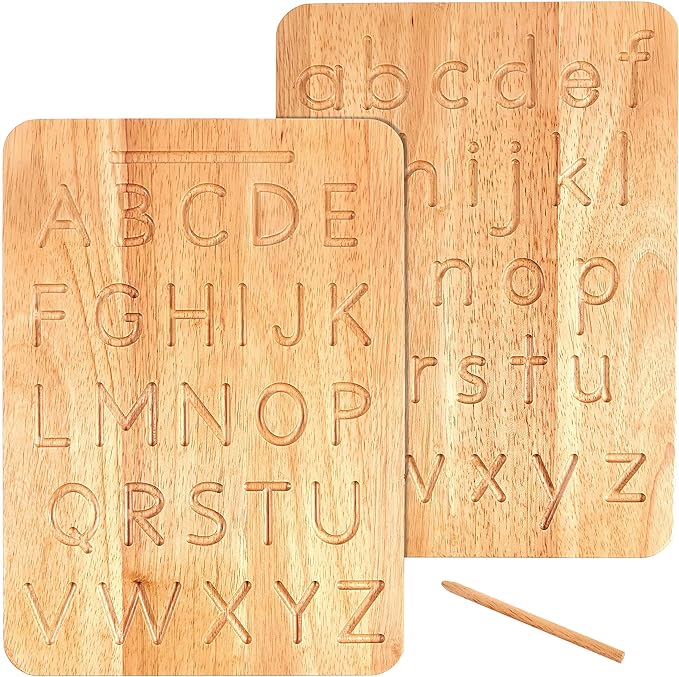
- Enhances literacy skills
- fine motor development
Use during quiet time or as part of a bedtime routine to wind down.
These tracing boards are widely used in Montessori classrooms and homes for their effectiveness in promoting early literacy skills in a tactile, engaging manner. They embody the Montessori philosophy of learning through doing, allowing children to explore and learn at their own pace.
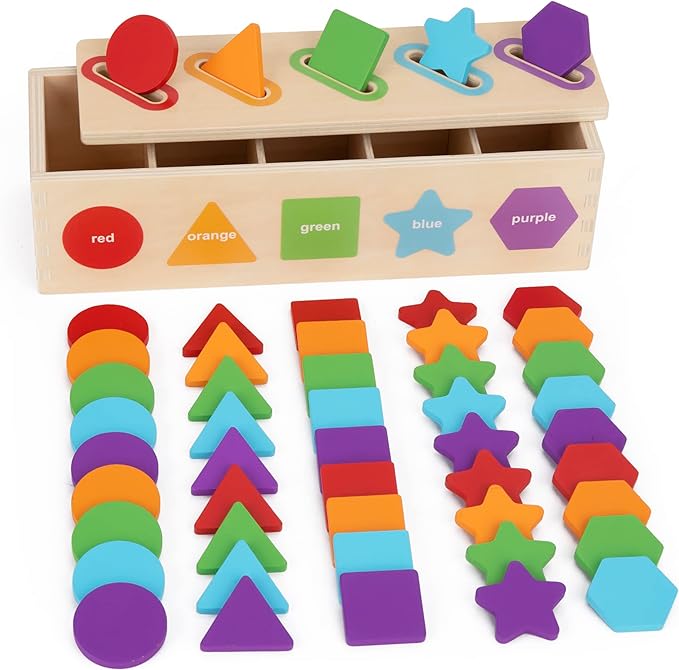
- Improves color recognition
- memory
- matching skills
Play as a family activity in the evening to enhance bonding and learning.
Montessori Color Matching Games are popular in both Montessori classrooms and homes for their simplicity and effectiveness in teaching color concepts. They align with the Montessori philosophy of fostering independent learning and cognitive development through engaging and purposeful play.
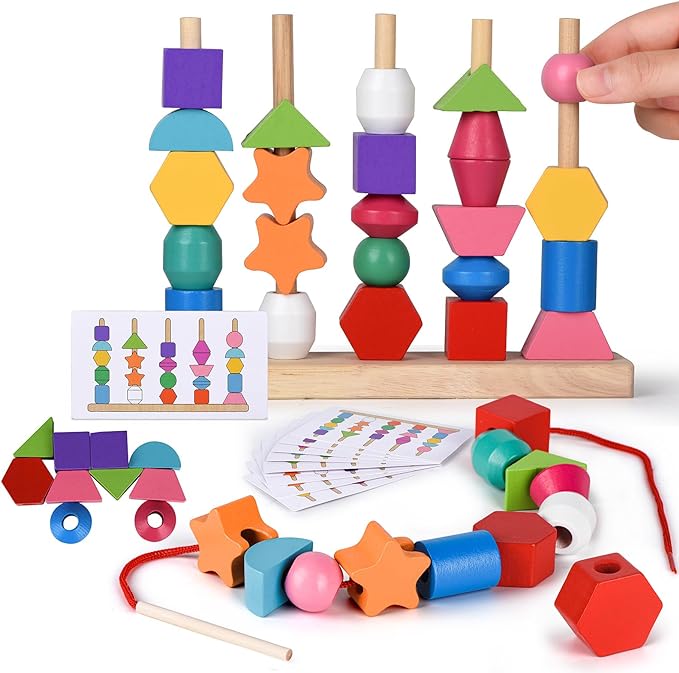
- Develops fine motor skills
- pattern recognition
- creativity
Use during quiet playtime or as part of a creative arts and crafts session.
The Montessori Bead Sequencing Set is used to teach children sorting, sequencing, and patterning. It allows children to engage in hands-on learning, enhancing their problem-solving skills and understanding of sequences. This type of activity is also beneficial for improving hand-eye coordination and fine motor skills. In line with Montessori principles, it encourages self-directed and tactile learning, making it a valuable educational resource in Montessori classrooms and homes.
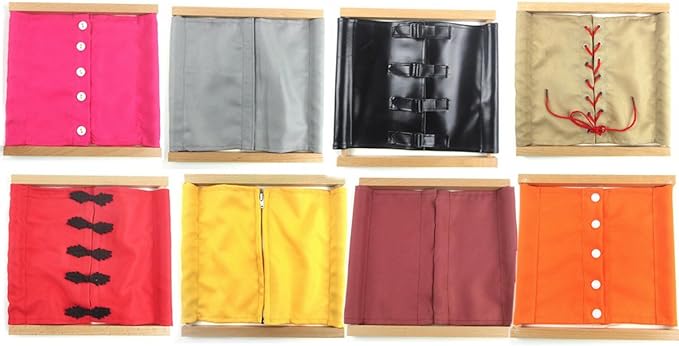
- Teaches self-care skills
- fine motor development
Integrate into morning dressing routines to practice self-care skills.
Dressing Frames are used in Montessori settings to support the development of practical life skills. They offer children a hands-on opportunity to practice and master the skills needed for daily dressing activities, aligning with the Montessori focus on self-sufficiency and real-world application in learning.
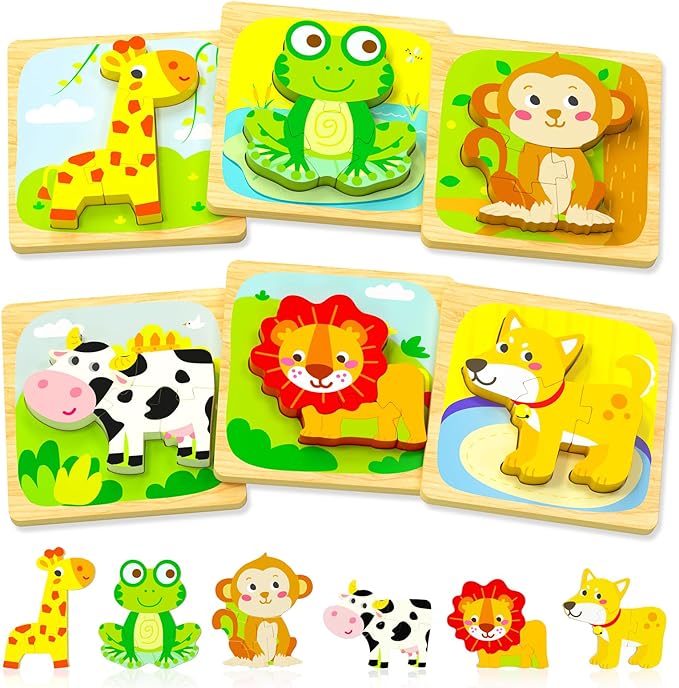
- Improves cognitive skills
- animal recognition
- fine motor development
Use during playtime or as an educational activity after meals.
Montessori Animal Puzzles are popular in both Montessori classrooms and homes for their educational value and alignment with Montessori principles of self-guided learning and discovery. They provide a fun, engaging way for children to learn about the animal world while developing important cognitive and physical skills.
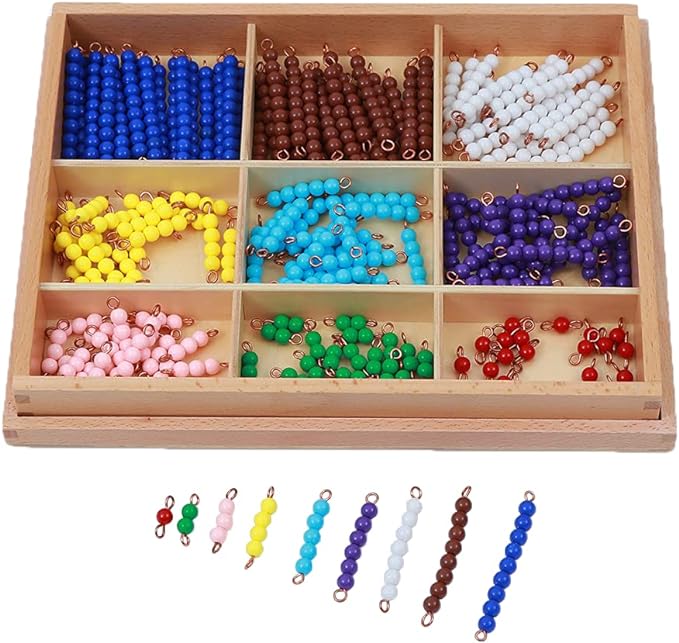
- Enhances mathematical skills
- counting
- number recognition
Integrate into morning activities or use as a counting game before bedtime.
Montessori Counting Beads serve as an important tool in early childhood education for building a foundational understanding of mathematics. They are designed to encourage hands-on learning and help children visualize and internalize number concepts through physical manipulation and observation, which is a core aspect of the Montessori teaching method.
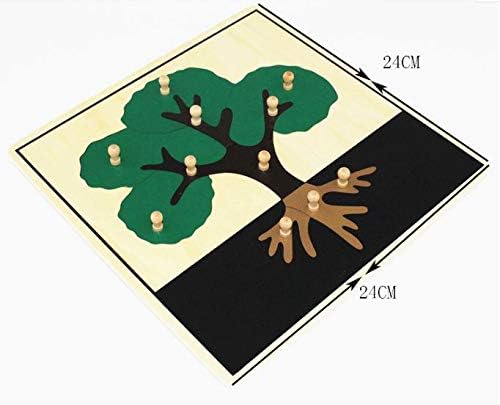
- Promotes botany knowledge
- problem-solving
- fine motor skills
Use during quiet time or as part of a nature learning session.
Montessori Botanical Puzzles are used in Montessori classrooms and homes to foster an early interest in science and nature. They align with the Montessori focus on self-directed learning and exploration, providing an engaging way for children to learn about the natural world.

- Teaches geography
- spatial awareness
- global cultures
Incorporate into a weekly exploration activity or as a learning tool during travel discussions.
Montessori Globes are essential in helping children develop a basic understanding of our world's geography, fostering curiosity and a foundation for more advanced geographical studies in later stages of education. They embody the Montessori principle of learning through tactile and visual experiences.
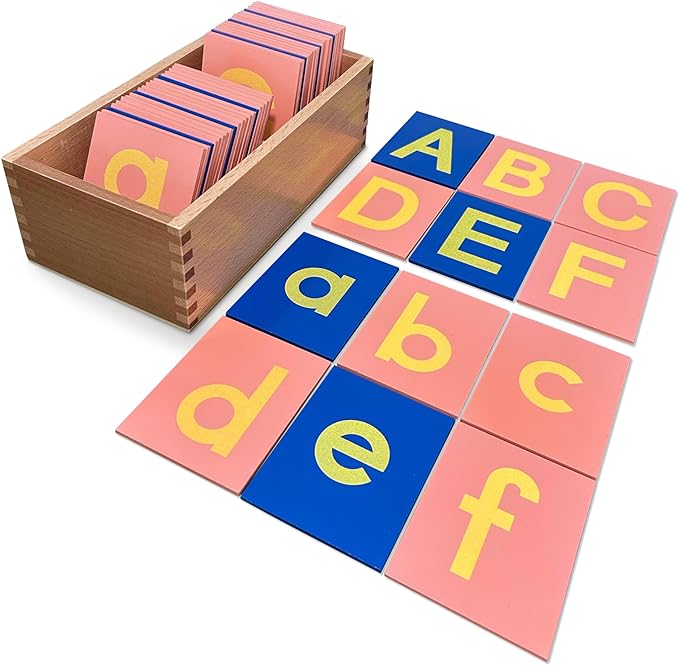
- Enhances literacy skills
- tactile learning
- letter recognition
Include in daily literacy activities or use during alphabet learning sessions.
Montessori Sandpaper Letters are used in both classroom and home settings to foster early literacy skills. They align with the Montessori method's focus on multi-sensory learning, allowing children to learn through touch, sight, and sound, which aids in deeper retention and understanding of the material.
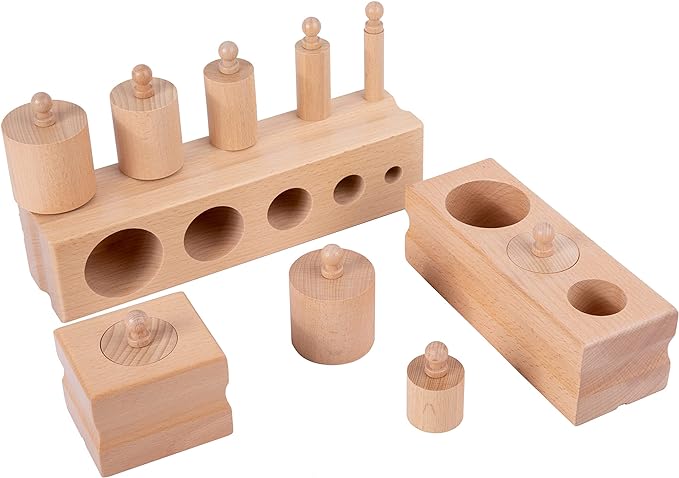
- Develops spatial awareness
- fine motor skills
- concentration
Use during free play to enhance spatial reasoning and concentration.
Montessori Knobbed Cylinder Blocks are widely used in Montessori classrooms for their effectiveness in promoting concentration, order, independence, and coordination in early childhood development. They offer a hands-on learning experience that aligns with the Montessori philosophy of encouraging self-directed and tactile learning.
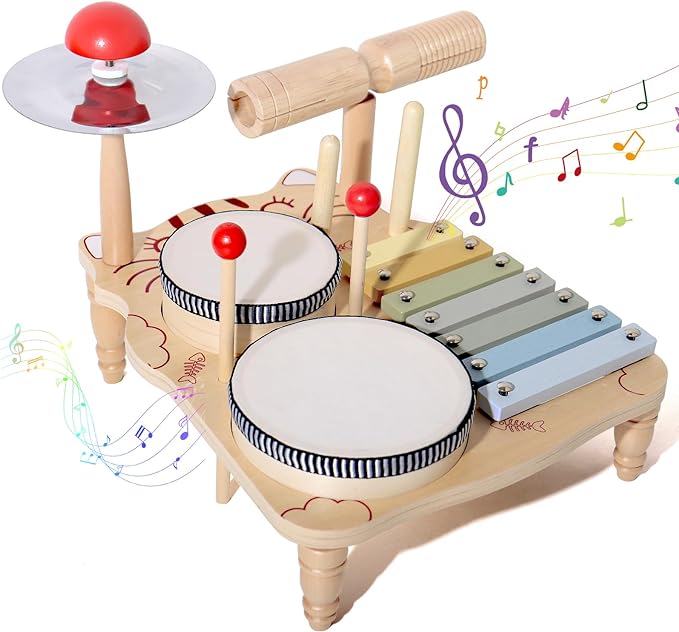
- Enhances musical skills
- creativity
- auditory development
Integrate into daily music time or use as a group activity with friends or family.
These instruments are typically made from high-quality, durable materials, ensuring they are safe and long-lasting for young children. The focus in a Montessori setting is not just on playing music, but on exploring sounds, understanding musical concepts, and developing a sense of rhythm and timing. The use of these instruments aligns with the Montessori principles of self-exploration and learning through hands-on, sensory experiences. They provide a fun and engaging way for children to develop their auditory skills and an early appreciation for music.
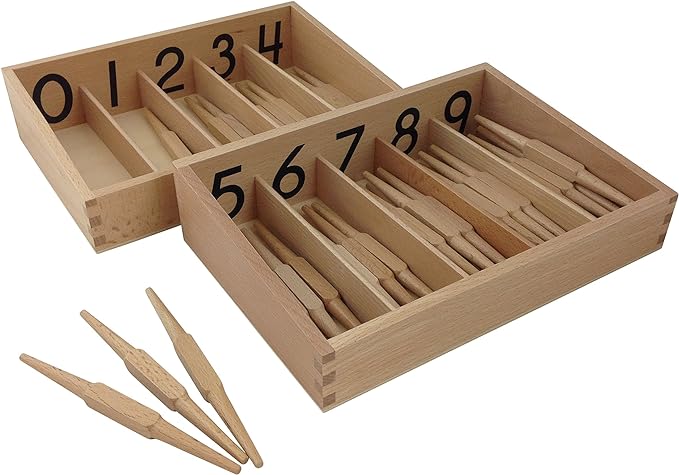
- Develops math skills
- fine motor development
- sorting skills
Incorporate into a daily math or counting routine, or use during quiet time.
The Montessori Spindle Box is a fundamental tool in Montessori mathematics education. It not only aids in numerical comprehension but also in the development of fine motor skills, hand-eye coordination, and concentration. This method of learning through physical interaction is in line with the Montessori philosophy of self-directed, experiential learning.
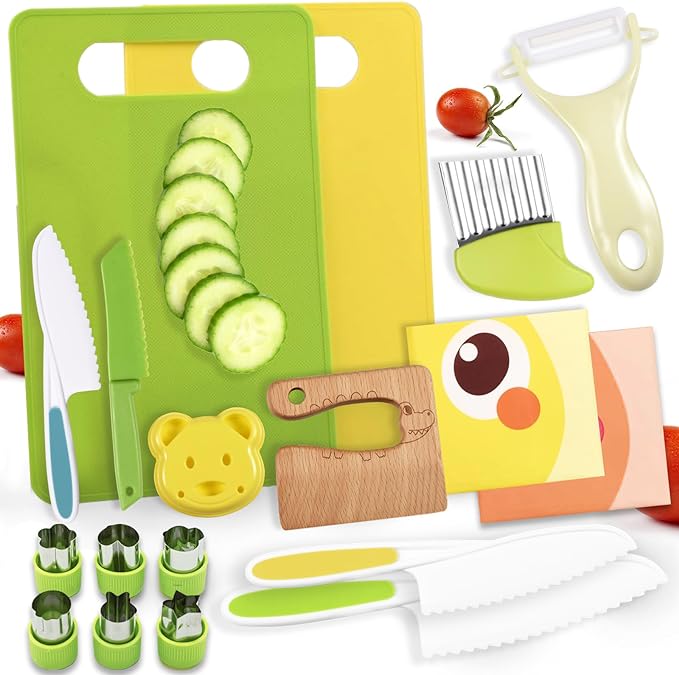
- Teaches practical life skills
- cooking basics
- fine motor development
Use during meal preparation to involve children in cooking and food preparation.
In a Montessori setting, these kitchen tools are part of a broader curriculum aimed at fostering self-reliance and practical skills. Children learn by doing, which in this case involves engaging in actual cooking or food preparation activities, under supervision, to develop a sense of responsibility and self-confidence.
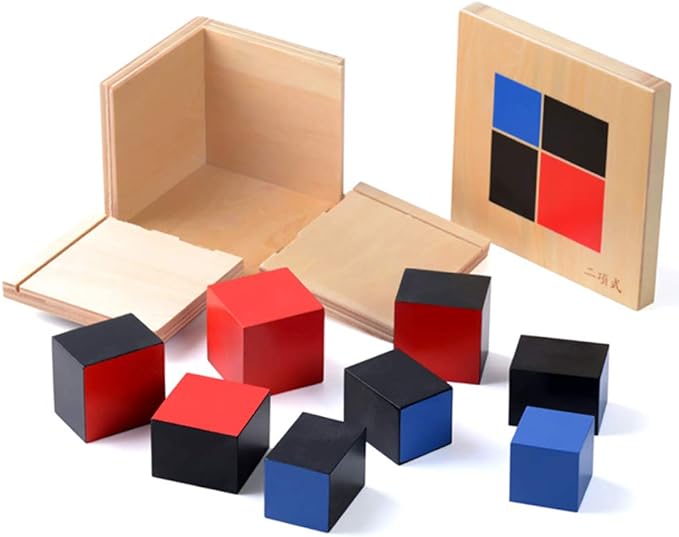
- Teaches early math concepts
- problem-solving
- cognitive development
Introduce during structured learning time or as part of a math-focused activity.
The Montessori Binomial Cube is an example of the Montessori method's unique approach to learning complex concepts through hands-on, sensory experiences. It lays the groundwork for understanding higher-level math in a concrete and accessible way.
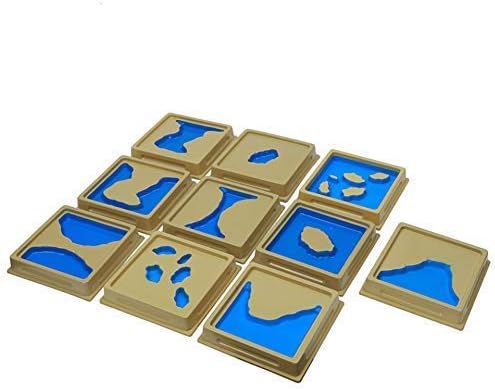
- Promotes geography knowledge
- scientific understanding
- exploration
Use in geography lessons or as a visual aid during storytelling about different environments.
Land and Water Form Trays in Montessori education encourage exploration and self-discovery, allowing children to physically engage with and visualize basic geographic concepts. This hands-on approach aligns with the Montessori method's focus on experiential learning.
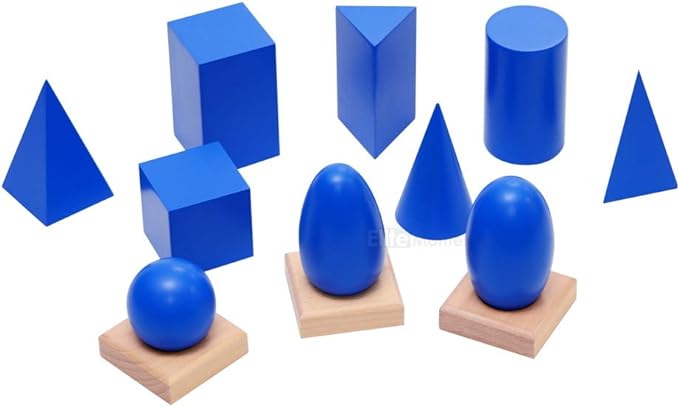
- Teaches geometry
- spatial awareness
- problem-solving
Use during learning sessions or as a creative play activity.
These Geometric Solids are an integral part of the Montessori curriculum, especially in the sensorial area. They help children develop spatial awareness, differentiate between shapes, and lay the groundwork for more advanced geometric concepts. The hands-on nature of these materials aligns with the Montessori philosophy of learning through direct experience and exploration.
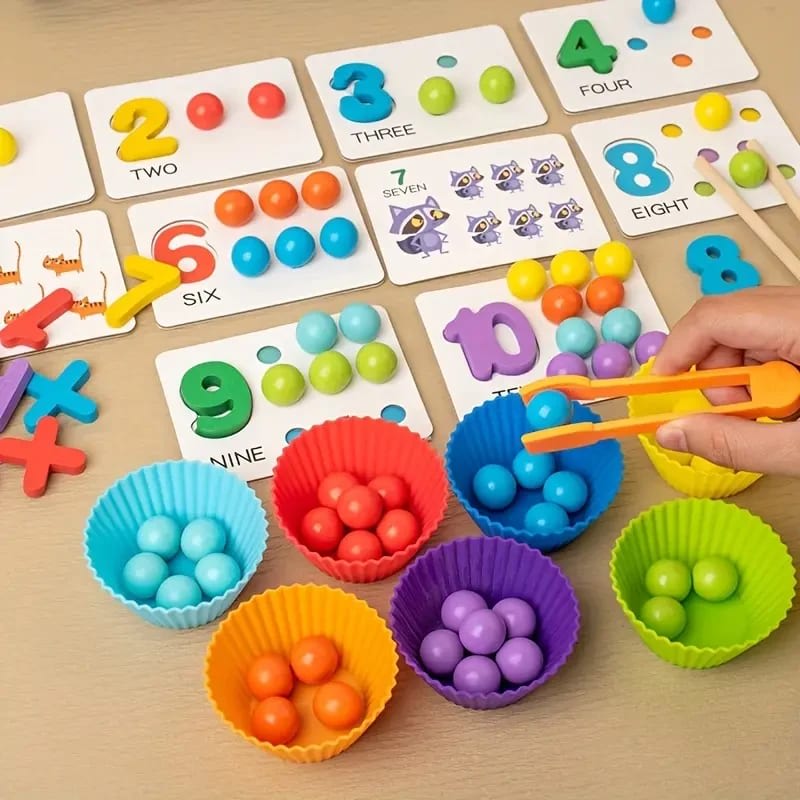
 Montessori Wooden Stacking Toy
Montessori Wooden Stacking Toy Shape Sorting Puzzle
Shape Sorting Puzzle Sensory Bin Kit
Sensory Bin Kit Balance Board
Balance Board Alphabet Tracing Board
Alphabet Tracing Board Color Matching Game
Color Matching Game Bead Sequencing Set
Bead Sequencing Set Practical Life Materials (Dressing Frames)
Practical Life Materials (Dressing Frames) Montessori Animal Puzzle
Montessori Animal Puzzle Counting Beads
Counting Beads Botanical Puzzle
Botanical Puzzle Montessori Globes
Montessori Globes Sandpaper Letters
Sandpaper Letters Knobbed Cylinder Blocks
Knobbed Cylinder Blocks Montessori Music Instruments
Montessori Music Instruments Spindle Box
Spindle Box Montessori Kitchen Tools
Montessori Kitchen Tools Binomial Cube
Binomial Cube Land and Water Form Trays
Land and Water Form Trays Geometric Solids
Geometric Solids